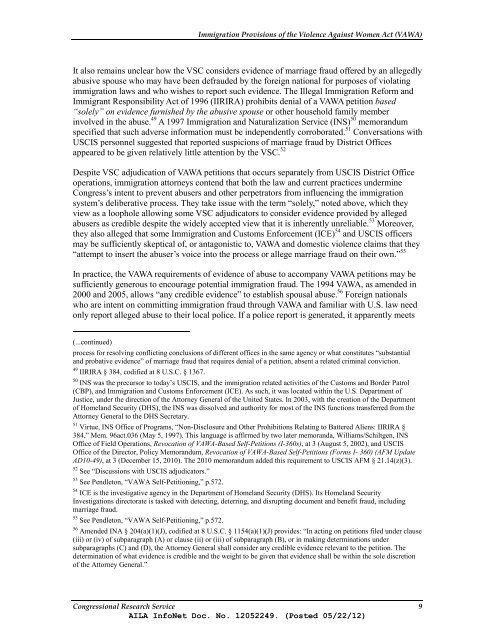Immigration Provisions of the Violence Against Women Act (VAWA)
Immigration Provisions of the Violence Against Women Act (VAWA)
Immigration Provisions of the Violence Against Women Act (VAWA)
Create successful ePaper yourself
Turn your PDF publications into a flip-book with our unique Google optimized e-Paper software.
<strong>Immigration</strong> <strong>Provisions</strong> <strong>of</strong> <strong>the</strong> <strong>Violence</strong> <strong>Against</strong> <strong>Women</strong> <strong>Act</strong> (<strong>VAWA</strong>)<br />
It also remains unclear how <strong>the</strong> VSC considers evidence <strong>of</strong> marriage fraud <strong>of</strong>fered by an allegedly<br />
abusive spouse who may have been defrauded by <strong>the</strong> foreign national for purposes <strong>of</strong> violating<br />
immigration laws and who wishes to report such evidence. The Illegal <strong>Immigration</strong> Reform and<br />
Immigrant Responsibility <strong>Act</strong> <strong>of</strong> 1996 (IIRIRA) prohibits denial <strong>of</strong> a <strong>VAWA</strong> petition based<br />
“solely” on evidence furnished by <strong>the</strong> abusive spouse or o<strong>the</strong>r household family member<br />
involved in <strong>the</strong> abuse. 49 A 1997 <strong>Immigration</strong> and Naturalization Service (INS) 50 memorandum<br />
specified that such adverse information must be independently corroborated. 51 Conversations with<br />
USCIS personnel suggested that reported suspicions <strong>of</strong> marriage fraud by District Offices<br />
appeared to be given relatively little attention by <strong>the</strong> VSC. 52<br />
Despite VSC adjudication <strong>of</strong> <strong>VAWA</strong> petitions that occurs separately from USCIS District Office<br />
operations, immigration attorneys contend that both <strong>the</strong> law and current practices undermine<br />
Congress’s intent to prevent abusers and o<strong>the</strong>r perpetrators from influencing <strong>the</strong> immigration<br />
system’s deliberative process. They take issue with <strong>the</strong> term “solely,” noted above, which <strong>the</strong>y<br />
view as a loophole allowing some VSC adjudicators to consider evidence provided by alleged<br />
abusers as credible despite <strong>the</strong> widely accepted view that it is inherently unreliable. 53 Moreover,<br />
<strong>the</strong>y also alleged that some <strong>Immigration</strong> and Customs Enforcement (ICE) 54 and USCIS <strong>of</strong>ficers<br />
may be sufficiently skeptical <strong>of</strong>, or antagonistic to, <strong>VAWA</strong> and domestic violence claims that <strong>the</strong>y<br />
“attempt to insert <strong>the</strong> abuser’s voice into <strong>the</strong> process or allege marriage fraud on <strong>the</strong>ir own.” 55<br />
In practice, <strong>the</strong> <strong>VAWA</strong> requirements <strong>of</strong> evidence <strong>of</strong> abuse to accompany <strong>VAWA</strong> petitions may be<br />
sufficiently generous to encourage potential immigration fraud. The 1994 <strong>VAWA</strong>, as amended in<br />
2000 and 2005, allows “any credible evidence” to establish spousal abuse. 56 Foreign nationals<br />
who are intent on committing immigration fraud through <strong>VAWA</strong> and familiar with U.S. law need<br />
only report alleged abuse to <strong>the</strong>ir local police. If a police report is generated, it apparently meets<br />
(...continued)<br />
process for resolving conflicting conclusions <strong>of</strong> different <strong>of</strong>fices in <strong>the</strong> same agency or what constitutes “substantial<br />
and probative evidence” <strong>of</strong> marriage fraud that requires denial <strong>of</strong> a petition, absent a related criminal conviction.<br />
49 IIRIRA § 384, codified at 8 U.S.C. § 1367.<br />
50 INS was <strong>the</strong> precursor to today’s USCIS, and <strong>the</strong> immigration related activities <strong>of</strong> <strong>the</strong> Customs and Border Patrol<br />
(CBP), and <strong>Immigration</strong> and Customs Enforcement (ICE). As such, it was located within <strong>the</strong> U.S. Department <strong>of</strong><br />
Justice, under <strong>the</strong> direction <strong>of</strong> <strong>the</strong> Attorney General <strong>of</strong> <strong>the</strong> United States. In 2003, with <strong>the</strong> creation <strong>of</strong> <strong>the</strong> Department<br />
<strong>of</strong> Homeland Security (DHS), <strong>the</strong> INS was dissolved and authority for most <strong>of</strong> <strong>the</strong> INS functions transferred from <strong>the</strong><br />
Attorney General to <strong>the</strong> DHS Secretary.<br />
51 Virtue, INS Office <strong>of</strong> Programs, “Non-Disclosure and O<strong>the</strong>r Prohibitions Relating to Battered Aliens: IIRIRA §<br />
384,” Mem. 96act.036 (May 5, 1997). This language is affirmed by two later memoranda, Williams/Schiltgen, INS<br />
Office <strong>of</strong> Field Operations, Revocation <strong>of</strong> <strong>VAWA</strong>-Based Self-Petitions (I-360s), at 3 (August 5, 2002), and USCIS<br />
Office <strong>of</strong> <strong>the</strong> Director, Policy Memorandum, Revocation <strong>of</strong> <strong>VAWA</strong>-Based Self-Petitions (Forms I- 360) (AFM Update<br />
AD10-49), at 3 (December 15, 2010). The 2010 memorandum added this requirement to USCIS AFM § 21.14(z)(3).<br />
52 See “Discussions with USCIS adjudicators.”<br />
53 See Pendleton, “<strong>VAWA</strong> Self-Petitioning,” p.572.<br />
54 ICE is <strong>the</strong> investigative agency in <strong>the</strong> Department <strong>of</strong> Homeland Security (DHS). Its Homeland Security<br />
Investigations directorate is tasked with detecting, deterring, and disrupting document and benefit fraud, including<br />
marriage fraud.<br />
55 See Pendleton, “<strong>VAWA</strong> Self-Petitioning,” p.572.<br />
56 Amended INA § 204(a)(1)(J), codified at 8 U.S.C. § 1154(a)(1)(J) provides: “In acting on petitions filed under clause<br />
(iii) or (iv) <strong>of</strong> subparagraph (A) or clause (ii) or (iii) <strong>of</strong> subparagraph (B), or in making determinations under<br />
subparagraphs (C) and (D), <strong>the</strong> Attorney General shall consider any credible evidence relevant to <strong>the</strong> petition. The<br />
determination <strong>of</strong> what evidence is credible and <strong>the</strong> weight to be given that evidence shall be within <strong>the</strong> sole discretion<br />
<strong>of</strong> <strong>the</strong> Attorney General.”<br />
Congressional Research Service 9<br />
AILA InfoNet Doc. No. 12052249. (Posted 05/22/12)







